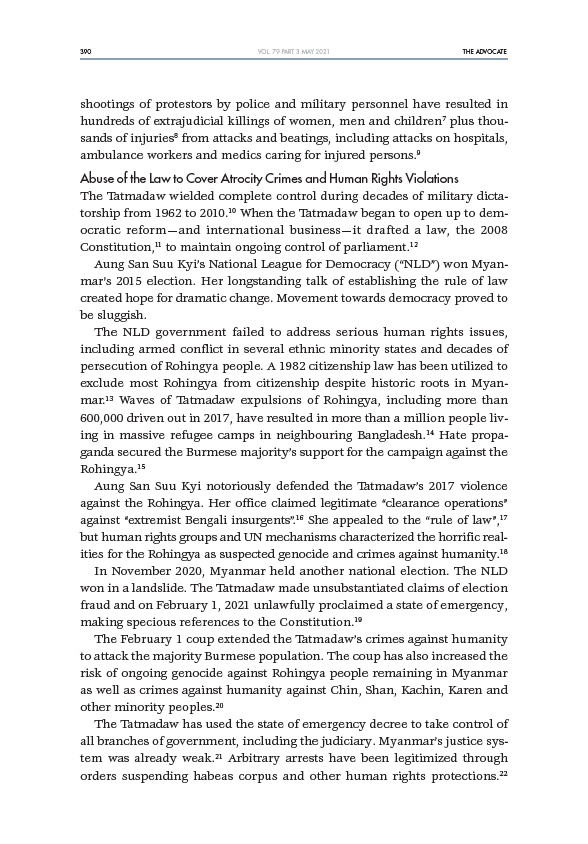
390 THE ADVOCATE
VOL. 79 PART 3 MAY 2021
shootings of protestors by police and military personnel have resulted in
hundreds of extrajudicial killings of women, men and children7 plus thousands
of injuries8 from attacks and beatings, including attacks on hospitals,
ambulance workers and medics caring for injured persons.9
Abuse of the Law to Cover Atrocity Crimes and Human Rights Violations
The Tatmadaw wielded complete control during decades of military dictatorship
from 1962 to 2010.10 When the Tatmadaw began to open up to democratic
reform—and international business—it drafted a law, the 2008
Constitution,11 to maintain ongoing control of parliament.12
Aung San Suu Kyi’s National League for Democracy (“NLD”) won Myanmar’s
2015 election. Her longstanding talk of establishing the rule of law
created hope for dramatic change. Movement towards democracy proved to
be sluggish.
The NLD government failed to address serious human rights issues,
including armed conflict in several ethnic minority states and decades of
persecution of Rohingya people. A 1982 citizenship law has been utilized to
exclude most Rohingya from citizenship despite historic roots in Myanmar.
13 Waves of Tatmadaw expulsions of Rohingya, including more than
600,000 driven out in 2017, have resulted in more than a million people living
in massive refugee camps in neighbouring Bangladesh.14 Hate propaganda
secured the Burmese majority’s support for the campaign against the
Rohingya.15
Aung San Suu Kyi notoriously defended the Tatmadaw’s 2017 violence
against the Rohingya. Her office claimed legitimate “clearance operations”
against “extremist Bengali insurgents”.16 She appealed to the “rule of law”,17
but human rights groups and UN mechanisms characterized the horrific realities
for the Rohingya as suspected genocide and crimes against humanity.18
In November 2020, Myanmar held another national election. The NLD
won in a landslide. The Tatmadaw made unsubstantiated claims of election
fraud and on February 1, 2021 unlawfully proclaimed a state of emergency,
making specious references to the Constitution.19
The February 1 coup extended the Tatmadaw’s crimes against humanity
to attack the majority Burmese population. The coup has also increased the
risk of ongoing genocide against Rohingya people remaining in Myanmar
as well as crimes against humanity against Chin, Shan, Kachin, Karen and
other minority peoples.20
The Tatmadaw has used the state of emergency decree to take control of
all branches of government, including the judiciary. Myanmar’s justice system
was already weak.21 Arbitrary arrests have been legitimized through
orders suspending habeas corpus and other human rights protections.22